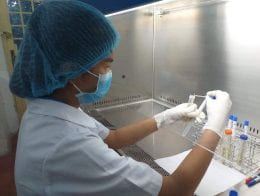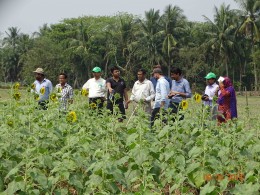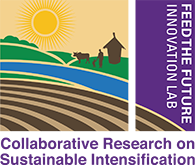Ban Naiheak, BSc in Veterinary Medicine at the Royal University of Agriculture (RUA), Cambodia, shows off the E.Coli bacteria she colonized in Microbiology Lab at RUA.
Ban Naiheak, a 22-year-old student at the Royal University of Agriculture, moved from a rural province in Cambodia to live with her aunt in Phnom Penh in order to pursue her education. Ms. Naiheak is majoring in Veterinary Medicine and she has just completed her research for her thesis and is ready to defend. Her research topic is “Antimicrobial Resistance Profiles Found in a Case Study of Escherichia Coli (E. Coli) from Cohabitant Pets and Environment at Animal Clinic in Phnom Penh.”
Ms. Naiheak is considered to be one of the more promising students in her cohort, according to many of her professors, and has been able to continue her studies thanks to a grant from CE SAIN in March 2019, funded by USAID though the Sustainable Intensification Innovation Lab (SIIL) at Kansas State University.
“I was not so sure if my thesis research could continue since it needed huge financial support and I would definitely have had to change the topic to be simpler […], but my thesis was made possible because my application for grant thesis support was accepted. I was so happy to hear that,” she stated.
In addition to studying, Ms. Naiheak worked as a part-time administrator at the university. During the first stage of her thesis research, she volunteered at an animal clinic to collect samples from puppies for three months. Seeing that she was so busy with her schoolwork, the university gave her permission to take a three-month break from work to focus on her research. Ms. Naiheak has said that the past three months were a hard time for her, however, it was a great opportunity to learn new knowledge and gain experience outside of the classroom. She also received great support from her supervisors and assistance with her research through their advice, She was also able to come and work in the microbiology lab as often she needed.
Her thesis has two main objectives: firstly, she wants to research the the presence of E. coli bacterial resistance in puppies and the animal clinic environment. Secondly, she wants to find out what types of existing treatments currently available can effectively treat puppies afflicted with E. coli bacterial infections. She says that the bacteria could be transmitted from the puppies to the environment, and even humans. When humans become exposed to the same kind of resistant bacteria, it came become very hard to treat. “My research is not a big topic that [will help all of] society,” she said, “but it will help the animal clinic to have a deeper understanding of this certain issue and help provide [people with] the research documentation that they can go and read.”
Ban Naiheak performs tests on bacteria in the Microbiology Lab at RUA.
Ms. Naiheak did encounter some challenges when the results of her research did not match to her hypothesis. In once instance during her research, she chose her sample from puppies that had diarrhea and was under three months old. She expected the result to be positive for the E. coli bacteria, but it came back negative. She will need to defend her findings and explain to the thesis committee the reasons for these differences. She says that knowing the history of the puppies’ background is very important and it helps to understand why the puppies got sick.
Naiheak wishes to pursue her master degree and do in-depth research on E. coli bacteria and how it can effect the environment and humans. At the moment, she is not sure of her eventual career goals, but she would like to find a job where she can share her knowledge and experience with other people.
“I would like to say thank you very much to CE SAIN and USAID for providing this grant to support undergraduate students on our research theses. Your support [has been] a big contribution to make our thesis research happen. Without your support, my preferred topic for the research thesis would not [have] happened. –Ban Naiheak
-Submitted by Manel Mao, CE SAIN Program Manager





